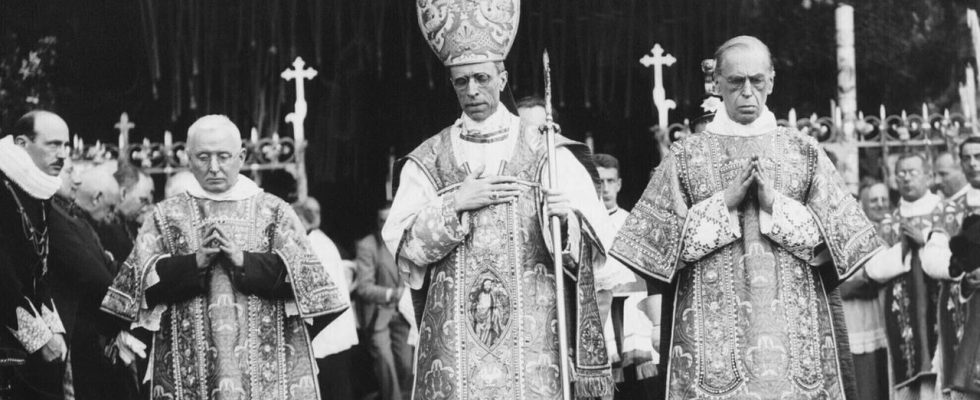For decades, it is not just the Catholic Church that has been concerned with the question of what Pope Pius XII did. knew about the Holocaust – and why he didn’t take a strong stand against it. A letter now provides clarity.
It is a yellowed sheet of paper, closely written on a typewriter. A letter dated December 14, 1942, recently found in the Papal Vatican archives. And which provides a new answer to the question that has been discussed for decades: What did Pope Pius XII know? about the crimes in Nazi Germany?
This letter, says Giovanni Coco, is so significant because “it is the only remaining evidence of correspondence between the Secretariat of Pius XII and the German resistance.”
Coco sits in a side room of the archives in the Belvedere courtyard in front of the Vatican Gardens. The archivist and historian discovered the letter, which is more than 80 years old. A document in which the Vatican was informed that the bodies of 6,000 people, mostly Jews and Poles, were destroyed every day in the SS cremation ovens near Rawa Rus’ka, i.e. in the Belzec extermination camp. Auschwitz is also mentioned.
Message “from inside the Third Reich”
The alarming message in the letter to Pope Pius’ secretariat: The Nazis were “actually serious” about exterminating Jews and Poles. “It’s a voice from the dragon’s belly,” says Coco. It comes directly from “the interior of the Third Reich”, with information that was circulating in the resistance. The Vatican archivist emphasizes: “This information, we are now certain, reached the ears of the Pope.”
The explosive letter was written by the German Jesuit Father Lothar König, a close acquaintance of Pope Pius’ personal secretary at the time, Robert Leiber. König worked for the Kreisauer Kreis bourgeois resistance circle as a kind of courier and liaison to the Vatican. His letter from December 1942 lay undiscovered in the Vatican for decades after Pius’ death.
Until 2019, under Pope Francis, the Secretariat of State made large quantities of documents from the time of the Pope, who led the Catholic Church in World War II, available to the Vatican archives. Disorganized and confused.
Archivist Coco got to work – until the explosive paper fell into his hands. The letter caught his attention, Coco explains, “because it wasn’t signed with his full name. Instead, it was signed with ‘your Lothar’.” The greeting “Dear friend” also made him sit up and take notice: “That gave me the impetus to read this letter more closely.”
The letter the Pope received from Germany was unmistakable. But the Pope remained silent about the atrocities described therein.
The doubts are eliminated
A letter that leaves no doubt: Pope Pius XII. was good, was very well informed that the Nazis systematically and en masse murdered Jews. “To say that there was little information or that it was not very credible is really difficult,” says Vatican employee Coco. This is “a trustworthy, very well-informed source that is very much believed.”
What’s remarkable is that this new evidence of Pius’s knowledge of Nazi crimes comes directly and unfiltered from the Vatican itself. Brisantes used to be held back there.
But now the finder can speak openly. The interview with the ARD studio Rome Archivist Coco got approval from his superior – and is then allowed to use it in private without supervision.
What does this mean for beatification?
To Pius XII. A beatification process has been underway in the Vatican for several decades. The “historical phase” of this process was completed in 2009. The then Pope Benedict XVI. said Pius XII. “heroic virtues”. In order to complete the beatification of Pius, according to the rules of the Catholic Church, proof of a miracle performed by Pius is now necessary.
Whether the document that has now been found will influence the ongoing process for the beatification of Pope Pius XII. will have? Letter discoverer Coco shrugs her shoulders: “I don’t know if this document will have any weight.” This lies in the competence of the Dicastery for the beatification and canonization processes, says Coco and adds: “Without a doubt it allows us to deepen our historical knowledge – about this man and his time.”
Coco points out that Lothar König, the courier for the Kreisau district, also asks for silence and caution in the letter. Perhaps, says Coco, this could be another explanation for Pius’ public silence on Nazi crimes.
New transparency?
When asked whether it was a sign of new transparency that the Vatican announced the discovery of the explosive letter to Pius on its own initiative and without filtering, the archivist chose a diplomatic answer: “It certainly shows that there is the will to close things “do with scientific seriousness,” and at this point the archivist pauses for a moment, then adds – “and without fear.”

